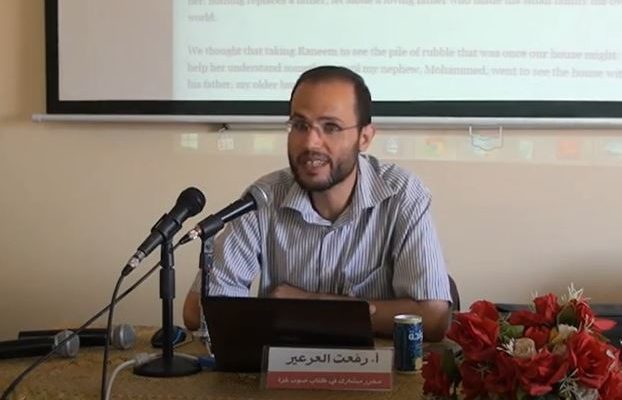
In an editors’ note, the newspaper acknowledged that its reporting did “not accurately reflect the facts”.
The New York Times has repudiated its own story about a Gaza poetry professor who was said to teach students empathy for Israelis.
In an editors’ note published on Tuesday, the newspaper acknowledged that its reporting did not accurately reflect the facts. “Had the Times done more extensive reporting on Mr. [Refaat] Alareer,” the note stated, “the article would have presented a more complete picture.”
The pointed, six-paragraph editors’ note is appended at the top of the online story and was published in the newspaper’s print edition on Tuesday. It begins: “After publication of this article, Times editors reviewed additional information that is at odds with the article’s portrayal of Refaat Alareer, a literature professor at Islamic University in Gaza, who was described as presenting Israeli poems in a positive light to his Palestinian students.”
The note summarized the premise of the Nov. 16 story by Jerusalem bureau chief Patrick Kingsley. In front of the Times reporter, it explained, Alareer praised a poem by a well-known Israeli poet as one that underscores the “shared humanity” between Israelis and Palestinians. “However,” the newspaper continued, “in a video of a class from 2019, he called the same poem ‘horrible’ and ‘dangerous.’ ”
In light of the additional information reviewed by the editors, the paper “concluded that the article did not accurately reflect Mr. Alareer’s views on Israeli poetry or how he teaches it.”
The Committee for Middle East Reporting and Analysis (CAMERA), whose analysis of the story’s inaccuracies and correspondence with the newspaper led to the correction, commended The New York Times for clearing the record but called on the paper to ensure that “facts will matter more than narrative” in future stories.
CAMERA research analyst Gilead Ini said the language of the editors’ note is important.
“It is good to see the newspaper take full responsibility in this case,” said Ini. “It’s not easy to admit when your reporting fell short, and The New York Times doesn’t always do so—credit where due.”
But Ini, who contacted Times’ editors prior to the correction, also pointed to the newspaper’s culture as a reason for the misreporting. “As long as reporters shape their coverage to fit a preexisting narrative, that flattens the conflict into a simplistic and false story of Palestinian innocence and Israeli guilt, these missteps will continue.”
“CAMERA’s Arabic department found the video of Alareer teaching hatred of Israelis and Israeli poetry,” said Andrea Levin, CAMERA’s executive director. “That should have been the newspaper’s job, but the story was apparently too good to check.”
Alareer’s history of anti-Israel and anti-Jewish bigotry on Twitter should have been a red flag, added Levin. “Sound reporting of the conflict needs to highlight the role of Palestinian incitement in perpetuating the conflict,” she said. “Instead, this piece acted as a whitewash of those behind indoctrination.”
In the original article, which remains unchanged online underneath the editors’ note, Alareer is cast as a “bridge builder”. He is said to teach students “appreciation” of Israeli poetry and empathy for Jews and is described as a surprising “champion” of Hebrew poetry.
Alareer’s lesson, the article claimed, undermines the narrative of Israelis “who often assume the Palestinian education system is simply an engine of incitement.”
The piece’s print headline, “Discovering Empathy With Political Enemies Through Poetry,” underscored the message.
(World Israel News / JNS).